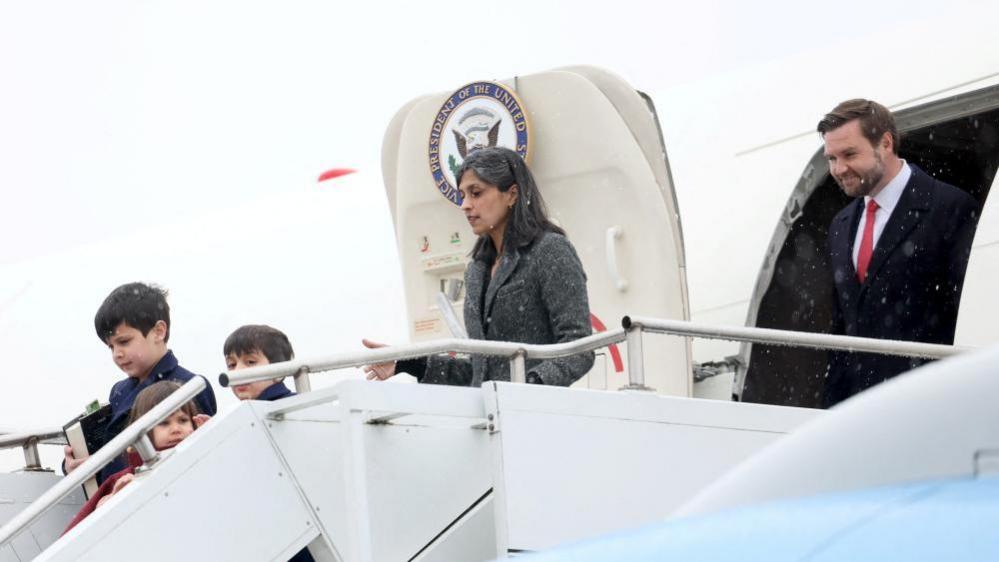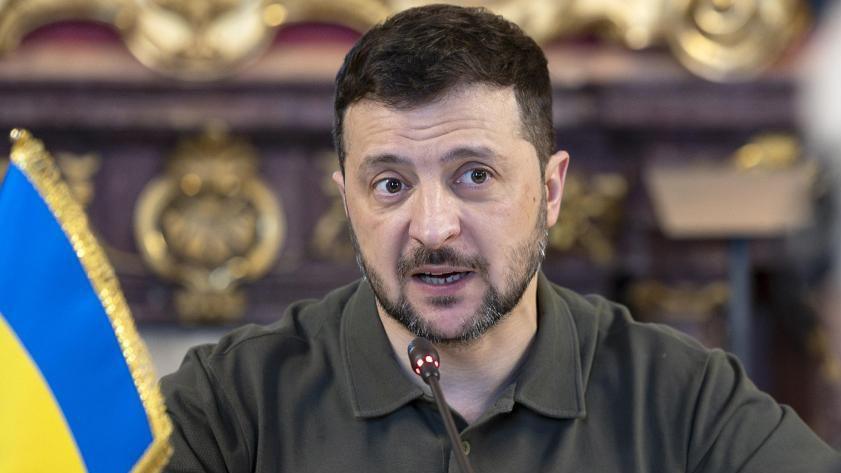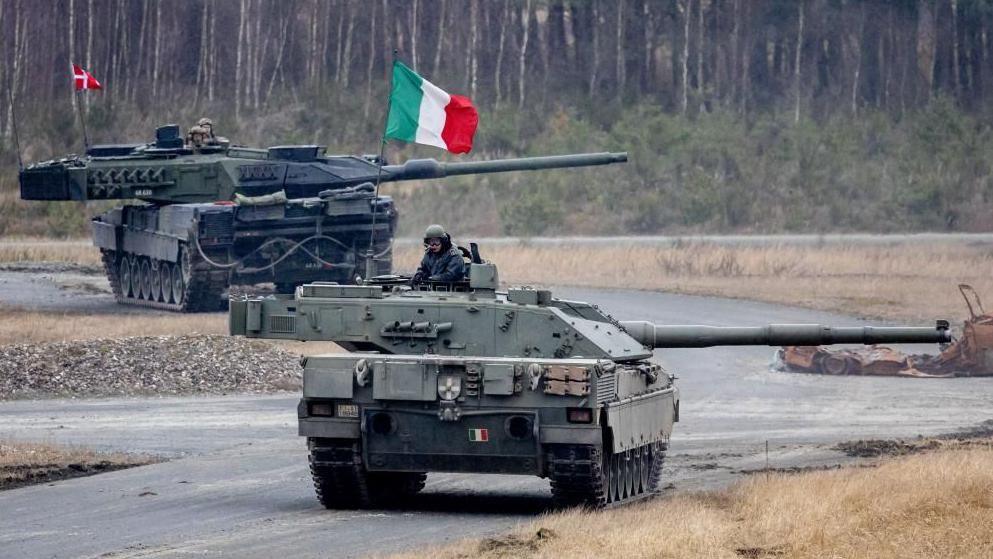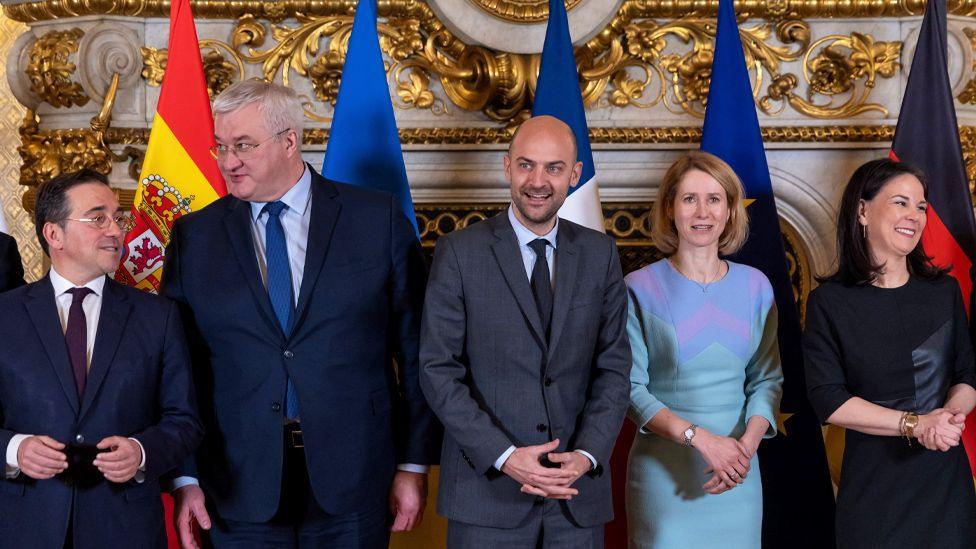Leaders set for key security meeting as 'old' world order at risk of crumbling

JD Vance has arrived in Munich for the conference and is expected to lay out the US plan for Ukraine
- Published
The US Vice President, JD Vance, Ukraine's President Zelensky and up to 60 other world leaders and decision-makers are due to convene in Munich over the next three days for the annual Munich Security Conference (MSC).
For nearly two decades now I have been attending and covering this event for the BBC and I cannot think of a year when there has been so much at stake in terms of global security. A senior and highly experienced Western official said this week "this is the most dangerous and contested time I have ever known in my career".
Why?
Put simply, the current world security order – the catchily named International Rules-based Order – is in danger of crumbling. Some would argue this is already happening.
The end of consensus
When President Putin launched his full-scale invasion of Ukraine three years ago it was widely condemned by much – although not all – of the world. Nato, the EU and the West in general reached an extraordinary level of unity in coming together to help Ukraine defend itself, without getting drawn into direct conflict with Russia.
Barring some demurring from Slovakia and Hungary, there was a general consensus that Putin's invasion must be seen to fail or Nato itself would be critically weakened while Russia would eventually be tempted to invade another neighbouring country, such as Estonia. It was often said that Ukraine should be given whatever it took and for as long as it took in order to secure a lasting peace from a position of strength.
Not any more.
President Trump has effectively pulled the rug out from Ukraine's negotiating position by conceding, via his Defence Secretary Pete Hegseth, that restoring Ukraine's territory to where it was before the first Russian invasion in 2014 is simply "not realistic".
The US has also dashed Kyiv's hopes of joining Nato, a key ambition of President Zelensky, and ruled out sending US troops to help protect its borders from the next time Russia decides to invade.
An even greater shock has come with the news that President Trump held an apparently cordial 90-minute phone call with President Putin, thus abruptly ending the West's three-year freeze in talking to the Russian leader that has been in place since the time of the invasion.

Ukraine's hopes of joining Nato have been dashed by the US
Over the next 72 hours we will be hearing in Munich from President Trump's team here in Munich what the details of their plan for Ukraine will be. Some of it is still to be worked out after his envoy, retired US Army General Keith Kellogg, travels to Kyiv next week.
But for now, Nato's unity is badly dented as clearly there is a wide difference of opinion over Ukraine between Washington and Europe. One wants the war to end as quickly as possible, even if it means conceding to many of Moscow's demands.
The other still believed, at least until this week, that with Russia losing around a thousand battlefield casualties a day and its economy facing dire long-term problems the best way to win a lasting peace would be to keep up the pressure on Moscow until its army was exhausted and it agreed to peace terms more favourable to Ukraine.
That won't be happening now.
Worrying cracks in Nato
For the Nato alliance, now in its 76th year, there are other worrying cracks starting to appear which will also come in for discussion here at the Munich Security Conference.
Last month President Trump announced he wanted to "buy" Greenland, an autonomous part of the Kingdom of Denmark. When Denmark's Prime Minister Frederiksen assured her population that "Greenland is not for sale" there followed what was called a "horrendous" phone call from Donald Trump who has not ruled out the use of force to take Greenland.
The idea of one Nato country threatening to seize part of another Nato country's territory would have been unthinkable up until now. In Greenland's case there is no justification for it on security grounds since there are more US troops on Greenland than Danish and Copenhagen is happy to agree ways to boost mutual defence for the island.
But even if nothing ever comes of this idea, and most of Scandinavia is dearly hoping that is the case, in some respects the damage has already been done. The message has gone out from the leader of the free world that it's OK to threaten your neighbours by force if you want their territory.
"It may be," says Lord Kim Darroch, the former UK national security adviser and British Ambassador to Washington, "that Trump's threat of economic measures against Nato ally Denmark, and his refusal to rule out military action against them, are just negotiating tactics. But even if nothing comes from it, it's done great damage. It's another signal of Trump's disdain for Nato. And it will be interpreted in Moscow and Beijing as a message that they have a free hand in Ukraine and Taiwan respectively".
Washington's European allies will be looking for some reassurance here in Munich that that is not the case. But President Trump is already well on the way to reshaping America's role in the world and the indications are he is unlikely to be listening to any complaints coming from Europe.
- Published12 February

- Published13 February
